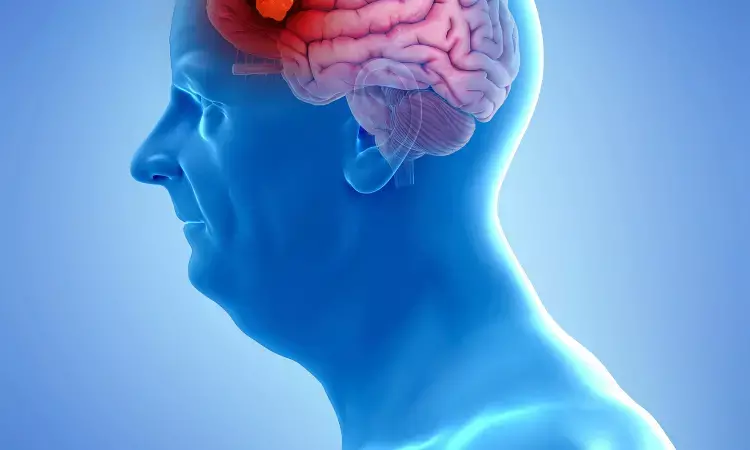- Home
- Medical news & Guidelines
- Anesthesiology
- Cardiology and CTVS
- Critical Care
- Dentistry
- Dermatology
- Diabetes and Endocrinology
- ENT
- Gastroenterology
- Medicine
- Nephrology
- Neurology
- Obstretics-Gynaecology
- Oncology
- Ophthalmology
- Orthopaedics
- Pediatrics-Neonatology
- Psychiatry
- Pulmonology
- Radiology
- Surgery
- Urology
- Laboratory Medicine
- Diet
- Nursing
- Paramedical
- Physiotherapy
- Health news
- Fact Check
- Bone Health Fact Check
- Brain Health Fact Check
- Cancer Related Fact Check
- Child Care Fact Check
- Dental and oral health fact check
- Diabetes and metabolic health fact check
- Diet and Nutrition Fact Check
- Eye and ENT Care Fact Check
- Fitness fact check
- Gut health fact check
- Heart health fact check
- Kidney health fact check
- Medical education fact check
- Men's health fact check
- Respiratory fact check
- Skin and hair care fact check
- Vaccine and Immunization fact check
- Women's health fact check
- AYUSH
- State News
- Andaman and Nicobar Islands
- Andhra Pradesh
- Arunachal Pradesh
- Assam
- Bihar
- Chandigarh
- Chattisgarh
- Dadra and Nagar Haveli
- Daman and Diu
- Delhi
- Goa
- Gujarat
- Haryana
- Himachal Pradesh
- Jammu & Kashmir
- Jharkhand
- Karnataka
- Kerala
- Ladakh
- Lakshadweep
- Madhya Pradesh
- Maharashtra
- Manipur
- Meghalaya
- Mizoram
- Nagaland
- Odisha
- Puducherry
- Punjab
- Rajasthan
- Sikkim
- Tamil Nadu
- Telangana
- Tripura
- Uttar Pradesh
- Uttrakhand
- West Bengal
- Medical Education
- Industry
Living in areas with more greenery may boost cognitive function: JAMA Study

Cognitive function at middle age is a strong predictor of whether a person may develop dementia later in life. Now, a new study led by a Boston University School of Public Health (BUSPH) researcher has found that increasing greenspace in residential areas could help improve cognition function in middle-aged women and that this association might be explained by a reduction in depression, which is also a risk factor for dementia.
Published in the journal JAMA Network Open, the study found that exposure to greenspace around one's home and surrounding neighborhood could improve processing speed and attention, as well as boost overall cognitive function. The results also showed that lowered depression may help explain the association between greenspace and cognition, bolstering previous research that has linked exposure to parks, community gardens, and other greenery with improved mental health.
"Some of the primary ways that nature may improve health is by helping people recover from psychological stress and by encouraging people to be outside socializing with friends, both of which boost mental health," says Dr. Marcia Pescador Jimenez, study lead and corresponding author, and assistant professor of epidemiology at BUSPH. "This study is among the few to provide evidence that greenspace may benefit cognitive function in older ages. Our findings suggest that greenspace should be investigated as a potential population-level approach to improve cognitive function."
For the study, Pescador Jimenez and colleagues from BUSPH, Harvard T.H. Chan School of Public Health, Brigham and Women Hospital, Harvard Medical School, and Rush Medical College estimated residential greenspace with a satellite image-based metric called the Normalized Difference Vegetation Index (NDVI). They measured psychomotor speed, attention, learning, and working memory among 13,594 women aged 61 on average and primarily White, from 2014 to 2016. The women were participants in the Nurses' Health Study II, the second of three studies that are among the largest investigations into the risk factors for chronic diseases among US women.
Adjusting for age, race, and individual and neighborhood socioeconomic status, the researchers found that greenspace exposure was associated with psychomotor speed and attention, but not learning or working memory.
In addition to depression, the researchers also examined the potential roles of air pollution and physical activity in explaining the association between greenspace and cognitive function, and they were surprised to only find evidence of depression as a mediating factor.
"We theorize that depression might be an important mechanism through which green space may slow down cognitive decline, particularly among women, but our research is ongoing to better understand these mechanisms," Pescador Jimenez says. "Based on these results, clinicians and public health authorities should consider green space exposure as a potential factor to reduce depression, and thus, boost cognition. Policymakers and urban planners should focus on adding more green space in everyday life to improve cognitive function."
Dr Kamal Kant Kohli-MBBS, DTCD- a chest specialist with more than 30 years of practice and a flair for writing clinical articles, Dr Kamal Kant Kohli joined Medical Dialogues as a Chief Editor of Medical News. Besides writing articles, as an editor, he proofreads and verifies all the medical content published on Medical Dialogues including those coming from journals, studies,medical conferences,guidelines etc. Email: drkohli@medicaldialogues.in. Contact no. 011-43720751


